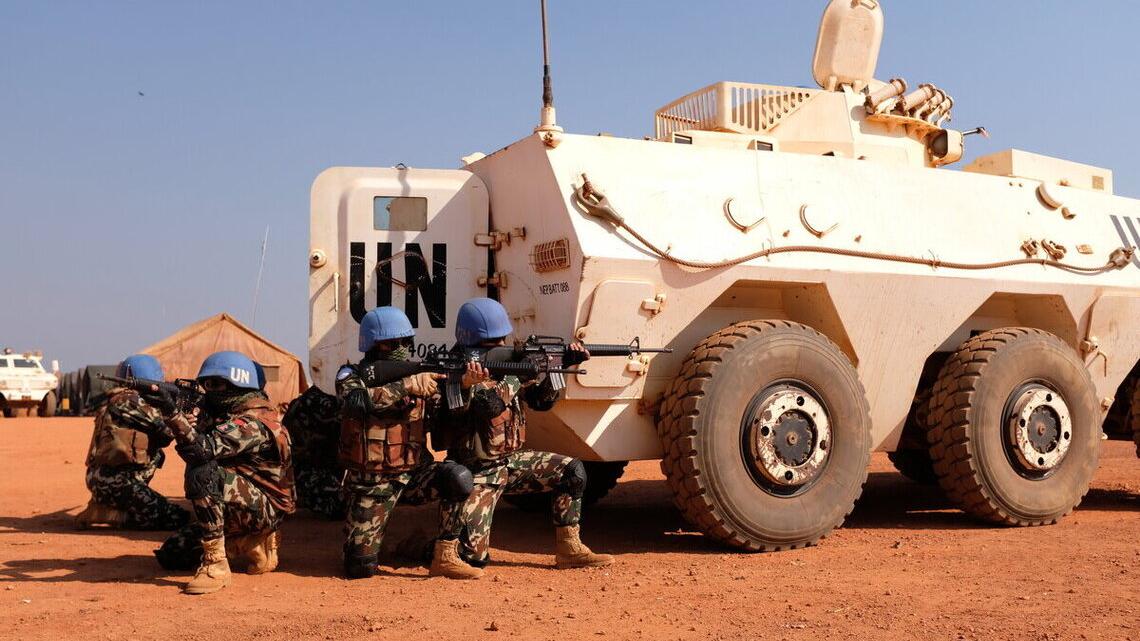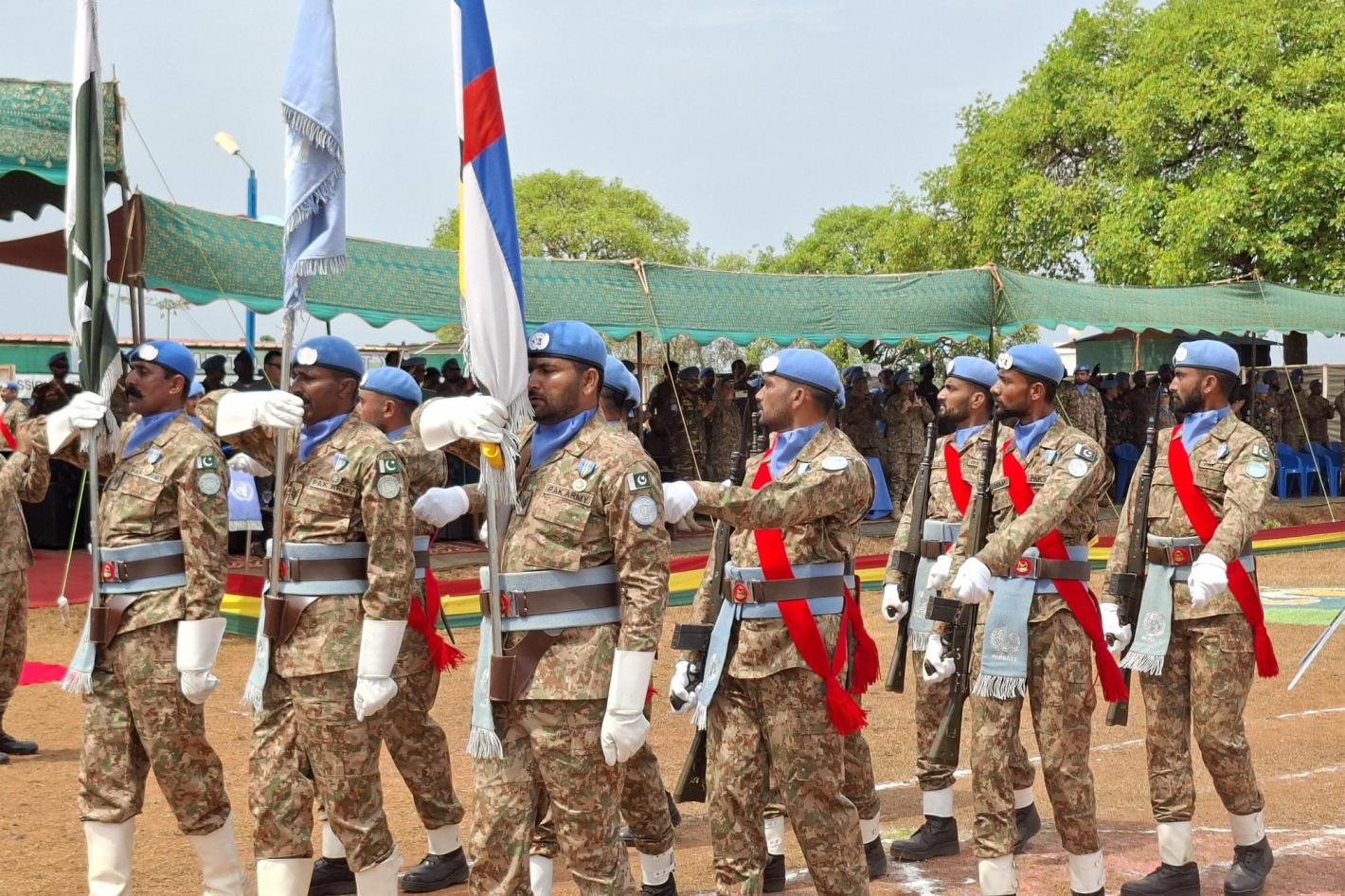In the northwest of the Central African Republic, the threat of the 3Rs (Retour, Reclamation, Rehabilitation) and other armed groups is once again hanging over the prefecture of Ouham-Pendé.In Bocaranga, peacekeepers from the Second Mechanized Infantry Company of the Bangladesh Battalion (BANBATT) and the Alpha Mechanized Company, part of the Quick Reaction Force (QRF) of the Nepalese Battalion (NEPBATT), stand ready to intervene.
BANBATT 7, commanded by Major S., arrived three months ago, and took up residence in the camp located at the entrance to the city. Its almost 100-strong troop is not unfamiliar with the terrain: staff maps stored in a canteen are accessible at all times; moments of rest are also moments of learning.
At the Company Operational Base (COB) in Bocaranga, the days are hot and the nights cold. The view is unobstructed, allowing for the observation of the whole city and the surrounding bush. The sentries are on round-the-clock duty, their assault rifles ready to defend the camp and protect civilians who may take refuge in the vicinity of the base. To this end, the manoeuvring areas in front of the base are intended to accommodate the latter, if necessary. These areas are also protected by mobile armoured vehicles provided by the two battalions.
Majors S., at the head of BANBATT and Major B., at the helm of NEPBATT, are conversant with peacekeeping missions in Africa. They are well acquainted with the terrain and are no strangers to the kind of challenges that may lay ahead. They never miss an opportunity to remind their men: “Do not forget that we are in the Central African Republic to implement our mandate. Our priority task is the protection of civilians. It’s about the values you stand for and the flag of the country you carry on your right shoulder!”
Major S. has previously served with the United Nations Mission in Liberia (UNMIL). He is one of a long line of Bangladeshi officers traditionally serving in UN operations. Out of more than 15 countries, Bangladesh, a member of the United Nations since 1974, ranks second on the list of countries contributing personnel for peacekeeping – since 1988 when the country participated in the United Nations Iran-Iraq Military Observer Group (UNIIMOG).
Major B. served with the United Nations Mission in Sudan (UNMIS). Nepal, a member of the United Nations since 1955, is the fifth largest contributor of peacekeepers and has participated in UN missions since their maiden intervention as part of the United Nations Observation Group in Lebanon Lebanon (UNOGIL) in 1958.
The bond between the brothers in arms is natural among these men who have left Dhaka or Kathmandu for a year. Indeed, Nepal and Bangladesh share a similar military, culinary and leisure culture. With a common military tradition originating from the British Indian Army, the officers regularly go for training during bilateral gatherings. The men converse in English, Bangladeshi and Nepalese, sometimes surprised to understand each other, and are happy to meet during cricket matches organised during rest periods. During such moments, the hierarchy and the strict separation between officers, non-commissioned officers and non-commissioned soldiers is put on hold. For the duration of a game, everyone becomes equal on the improvised stadium, before returning to their respective barracks.
The men’s work outfits – different from the ceremonial uniform – remain impeccable despite the difficult living conditions. Regular haircuts are the norm and the men salute faultlessly. The base itself is particularly well maintained and built to last. The few concrete alleys are lined with trees planted by honored guests – the commanders and officers who have succeeded each other since the arrival of BANBATT in Bocaranga. At the foot of the observation platform, a plaque pays homage to the memory of the Bangladeshi peacekeepers who lost their lives in the Central African Republic.
Life in the camp is punctuated by the five calls to prayer of the muezzin, the military chaplain who holds the rank of a non-commissioned officer. He prays with the men before each departure on mission and before meals – whose spicy scents comfort these men far from home.
The fifty or so men who make up the Nepalese company succeeded the Rwandan and Portuguese QRFs. With its many tents, the conditions in the temporary base of this special force are rougher – but this does not diminish their operationality. These men, all from different elite units of the Nepalese army, are “Gurkhas”. Renowned for their courage, restraint and professionalism, these brave fighters are feared by the enemy, whom they, in turn, respect. They can equip themselves in less than seven minutes before taking to the field; their armoured tanks are on stand-by for action at any time. In operation, no one can see their faces or eyes, as was the case during a convoy attack exercise carried out in parallel with the Bangladeshi peacekeepers.
Captain R., in a black tracksuit, looks relaxed. Yet, in English and Nepalese, he commands his platoon firmly. Nothing escapes his gaze behind his glasses that reflect the scene: his men, clad in blue helmets, their faces covered with the “shemagh” – a scarf adopted by commandos from all over the world – stand at attention, their weapons ready for inspection and the start of the exercise.
A word from the captain and, in a few seconds, the men join the light armoured vehicles and infantry combat vehicles that hurtle off to simulate an alert. The most impressive soldier remains the gunner in his turret, his hands glued to his machine gun. He is the most exposed, but he is also the one who will respond to any convoy attack or to protect the population. Above the Nepalese flag is his qualification patch: “Rangers”.
On the other side of the manoeuvring area, Captain T. of BANBATT gives his orders to his men, chronometer in hand. They come out of the hatches and position themselves almost in a phalanx, the most appropriate tactical position to defend themselves and ensure the safety of the convoy. Here too, there is no room for error: “The lives of my men and the people we are escorting are at stake. In addition to regular patrols, our mission is to escort all convoys that cross our vast area of responsibility on dangerous roads due to both the presence of armed groups and the state of the road network.”
A few hours later, while the men are getting ready to enjoy the evening over a hot drink, exchange strategies and talk about their families, Ganesh and Allah, the general alert is given: the incessant rumours leave no room for doubt. The soldiers immediately return to their battle stations and a Quick Reaction Force team is dispatched to an outpost for reconnaissance. They will all return at dawn…
Since the beginning of their participation in peacekeeping operations (1988 for Bangladesh and 1958 for Nepal), 130 Bangladeshi peacekeepers and 74 Nepalese blue helmets have died in the service of peace. This article is a tribute to their memory.






